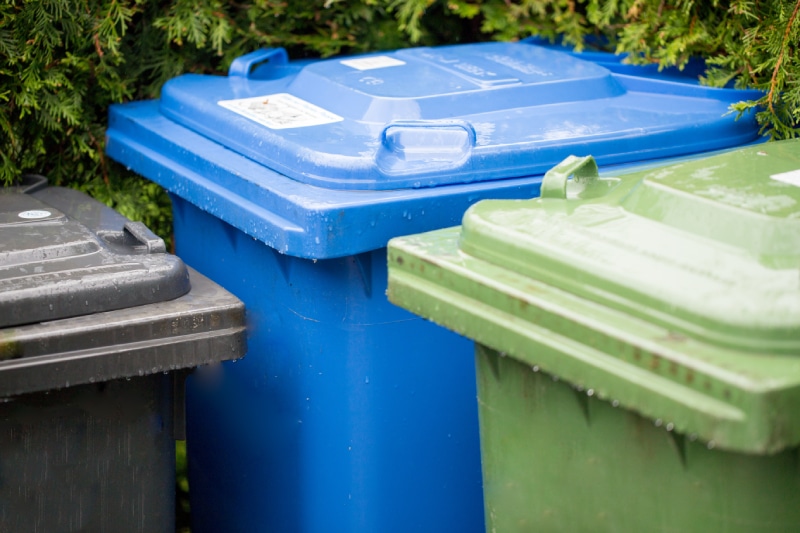
Garbage bins are a popular nesting and feeding spot for many common pests, especially mice. With places to hide, plenty of moisture, and ample food, mice can find everything they need for survival and reproduction under the right trash can conditions. Read this comprehensive guide to learn how to mouse-proof your garbage cans and shut them out from their all-you-can-eat buffet.
What attracts mice to garbage cans?
In short: food and shelter. Mice constantly search for new food sources and warm, hidden places to live. A typical garbage can provides everything a mouse looks for in a home. Because of decaying food items, garbage cans’ moisture content is high. The food bits are a great source of nutrition, and most of the time, garbage cans are left dark and unattended. If your garbage cans sit near or are around taller grass, weeds, or shrubs, mice will use the surrounding roughage to remain out of sight.

Can mice chew through garbage cans?
While it’s more common for mice to find existing access points like cracks or holes, they’re capable of chewing through plastic garbage cans. They would likely only do this if it’s making an access point larger rather than creating a hole from scratch. An area a mouse has chewed through has tattered edges that point outward. The thicker the plastic, the more difficult it would be for a mouse to chew through.
Do mice carry diseases?
According to the CDC, mice are known to spread many diseases worldwide. They can spread disease to people directly if a human touches a mouse, its droppings, urine, or saliva. Mouse bites can spread disease, cause allergic reactions, or create infections. It’s not always easy to tell if a rodent is carrying a disease, because most of the diseases they carry do not affect them. Mice can also carry ticks, mites, and fleas, which they can transfer to you or your pets.
How to keep mice out of your garbage
A mouse in your trash can is a common pest problem. It can be hard to regulate their access to outdoor bins, especially in colder months, as mice squeeze through cracks or crevices to find a bit of warmth. Below are some preventative measures you can take to help keep mice out of your garbage:
- Heavy-duty trash bags: Heavy-duty trash bags act as a barrier between pests and your garbage. The thicker material is less susceptible to breaks or tears while waiting for pick-up day.
- Secure lids: Make sure you seal the tops of your garbage cans. If it’s no longer sealing, use clips, bungee cords, or even a weight to hold the lid shut. Doing this is a great way to prevent access without much work.
- Rinse food containers: The less there is to attract mice to your garbage, the less likely you’ll have to get them out. Rinse food containers before throwing them away, and dispose of any liquid in your sink. Try composting organic material to keep it separate from your garbage.
- Keep bins clean: If your trash bin ends up dirty from a broken garbage bag or spill, clean it up as soon as possible. Use a garden hose with a spray attachment to remove any food waste from the exterior and interior. Let it dry completely before putting new trash bags inside.
Signs of a mouse infestation
Below are the most common indicators of a mouse problem:
- Droppings: Rodent droppings, which look like brown or black rice-grain-sized pellets, are most often found around food packages, in drawers and cupboards, or under the sink.
- Nesting: Shredded paper, cardboard, fabric, or dried plant matter in piles is a typical sign a mouse is working on creating a nest for breeding.
- Odors: Mouse urine has a strong, offensive odor. You may also experience stale smells coming from hidden areas.
- Stains: Mice can leave dark streaks on walls near the entrances and exits to their nests.
Pest control services
If you suspect you have a mouse in your garbage can, it’s likely they aren’t alone. The best way to handle a mouse infestation is by calling Hawx Pest Control. Our teams focus on ensuring the highest quality results, leading to a safer and more reliable outcome that addresses current problems and helps to prevent future infestations. Call us today for a free estimate to get your pest problem under control.
RELATED POSTS



